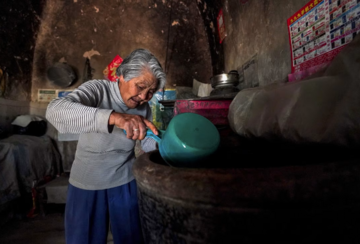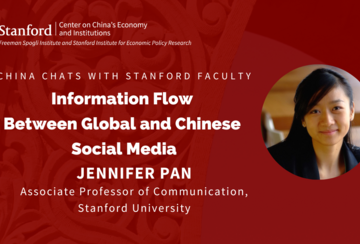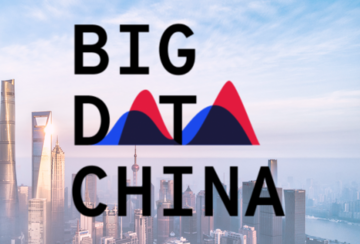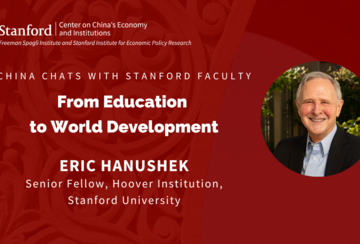
In December 2022, Zhenan Bao, Professor of Chemical Engineering at Stanford University, spoke about her journey to becoming a renowned chemical engineer and innovator and her passion for mentoring the next generation of innovators.
The Stanford Center on China’s Economy and Institutions and Asia Society Policy Institute’s Center for China Analysis co-organized a closed-door roundtable on the scope, impact, and implications of China’s industrial policy and produced a summary report of the discussion.

The Financial Times spoke with Scott Rozelle about the education and the “Covid generation” — the children whose lives have been upended through cycles of lockdowns under China’s hallmark zero-Covid policy.

SCCEI Research Scholar speaks with npr host Emily Feng about the current COVID situation in rural China, saying there is fear of rural villages being 'left on their own in a dark, COVID winter.'

China expert Aihemaitijiang (Ahmatjan) Rouzi reviewed Scott Rozelle's book, "Invisible China," for the Sino-German Agricultural Magazine.

Dr. Susan Shirk joined Stanford Libraries and the Stanford Center on China’s Economy and Institutions as the featured speaker of the 2022 Dr. Sam-Chung Hsieh Memorial Lecture.

Scott Rozelle and Matthew Boswell comment on China's invisible rural workforce in their piece published in Foreign Affairs.

US-China Business Council President Shares Insights on US-China Relations in Private Roundtable
SCCEI hosted a private roundtable discussion with the president of the US-China Business Council, Craig Allen, and a select group of Stanford faculty and business leaders, discussing technology competition and the shifting business environment between the US and China.

In China’s Rapidly Ageing Society, Elderly Rural Residents Must Not Be Left to Fend for Themselves
Author Lijia Zhang quotes Scott Rozelle in her opinion piece in the South China Morning Post looking at how China’s ageing problem is particularly acute in rural areas, where elderly residents often have no children around to care for them and pensions are too low to live on.

"Can robot-driven advanced manufacturing be a panacea for China’s slowing economy? China sure hopes so." The Wire China author Isabella Borshoff quotes SCCEI co-directors Hongbin Li and Scott Rozelle in pursuit of the answer.

Pan’s research focuses on political and authoritarian politics, including how preferences and behaviors are shaped by political censorship, propaganda, and information manipulation.

In this video short, Scott Rozelle, SCCEI Co-Director sits down with Scott Kennedy, CSIS Trustee Chair in Chinese Business, to discuss Big Data China, a new project aimed at bridging the gap between cutting-edge academic research on China and the Washington policy community.
Scott Rozelle is interviewed for the "What China Wants by Sam Olson" podcast, where he discusses "The Dangers from Invisible Chine," how the massive rural population threatens the country's future.
The Economist features Scott Rozelle and Natalie Hell's book "Invisible China" in this article highlight China's efforts to improve their human capital and face the invisible crisis no one knows about.
Stanford Senior Fellow Eric Hanushek joined SCCEI for a conversation on his research looking at the worldwide progress of achieving the UN's Sustainable Development Goals. Hanushek compares different countries' PISA scores and incomes in effort to answer the following questions: Who is competitive? How do labor skills affect development? How skilled is China?

SCCEI joins forces with the Asia Society Policy Institute (ASPI) to convene private roundtables comprised of social science experts who conduct data-intensive research into timely issues confronting China’s economy.

MIT professor Yasheng Huang joined SCCEI for a conversation on the fundamentals of U.S.-China relations and shared his thoughts on how the U.S. can disrupt current bilateral tension and advocated for more data-based, factual, and analytical discussions on China.

New Books Network Podcast: "Invisible China" with Author Scott Rozelle and Host Peter Lorentzen
Scott Rozelle joins Peter Lorentzen on this podcast episode discussing Scott Rozelle and Natalie Hell's new book, Invisible China: How the Urban-Rural Divide Threatens China's Rise.

Stanford professor Jennifer Pan joined SCCEI for a conversation on her new research looking at information flow from the U.S. to China via social media during the COVID-19 pandemic.

CSIS Trustee Chair and SCCEI Collaborator Scott Kennedy and SCCEI Faculty Affiliate Yiqing Xu join the podcast Politics+Media 101 to discuss Russia-China relations and the possible implications the war in Ukraine will have on China-US relations.

"Big Data China" aims to bridge the gap between cutting-edge quantitative academic research and the Washington policy community. On February 11, 2022, SCCEI and CSIS hosted their first Big Data China event, "A Liberal Silent Majority in China?" Curated highlights from the first feature of the collaboration are included below.

China's Human Capital Problem: How are Industrialization and Automation Affecting Chinese Workers?
On the Sound of Economics Podcast Giuseppe Porcaro is joined by Alicia García-Herrero and Scott Rozelle to talk about the impact of industrialization and automation are having on rural and low-income workers in China.

The Little Red Podcast interviewed FSI senior fellow and SCCEI co-director Scott Rozelle on their podcast to discuss whether common prosperity in China can trickle down to the countryside or not and how China's rural population came to be where they are today.

"By 2016, China had the world’s largest stock of operational robots. This was a massive increase from 2010, when it trailed Japan, the United States, Germany, and South Korea. To learn why and how China is automating so rapidly, [Erin Slawson] spoke with Dr. Hongbin Li, Co-Director of the Stanford Center on China’s Economy and Institutions (SCCEI)."





